University Psychology Assignment: False Memory and Perception Review
VerifiedAdded on 2023/01/19
|11
|2645
|97
Literature Review
AI Summary
This literature review delves into the intricate relationship between false memory and perception, exploring how these cognitive processes influence human life. The review examines several peer-reviewed articles, including research by Nash et al. (2017) on misinterpretations of false memory prevalence, Laney and Loftus (2013) on recent advances in false memory research, Pardilla-Delgado and Payne (2017) on the impact of sleep on true and false memory, Dewhurst et al. (2018) on individual differences in susceptibility to false memories, and Kaplan et al. (2016) on the role of emotion in false memory. The analysis covers various aspects, from the flawed logic associated with false memories to the influence of sleep and emotions on memory formation and distortion. The review also highlights the implications of these findings, particularly in legal contexts like eyewitness testimony. The articles utilize both qualitative and quantitative data collection methods to investigate the various factors that contribute to the creation and persistence of false memories.
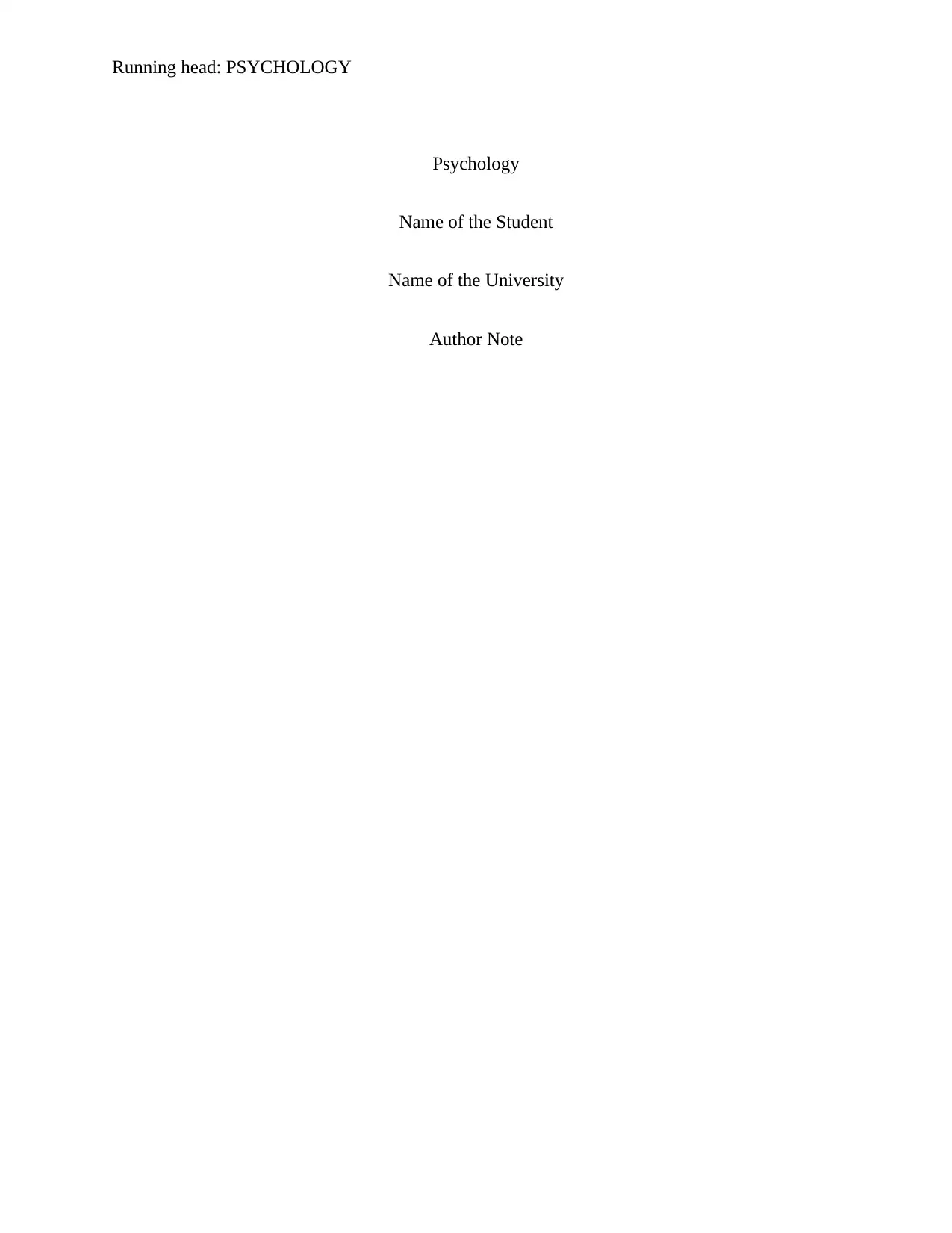
Running head: PSYCHOLOGY
Psychology
Name of the Student
Name of the University
Author Note
Psychology
Name of the Student
Name of the University
Author Note
Paraphrase This Document
Need a fresh take? Get an instant paraphrase of this document with our AI Paraphraser
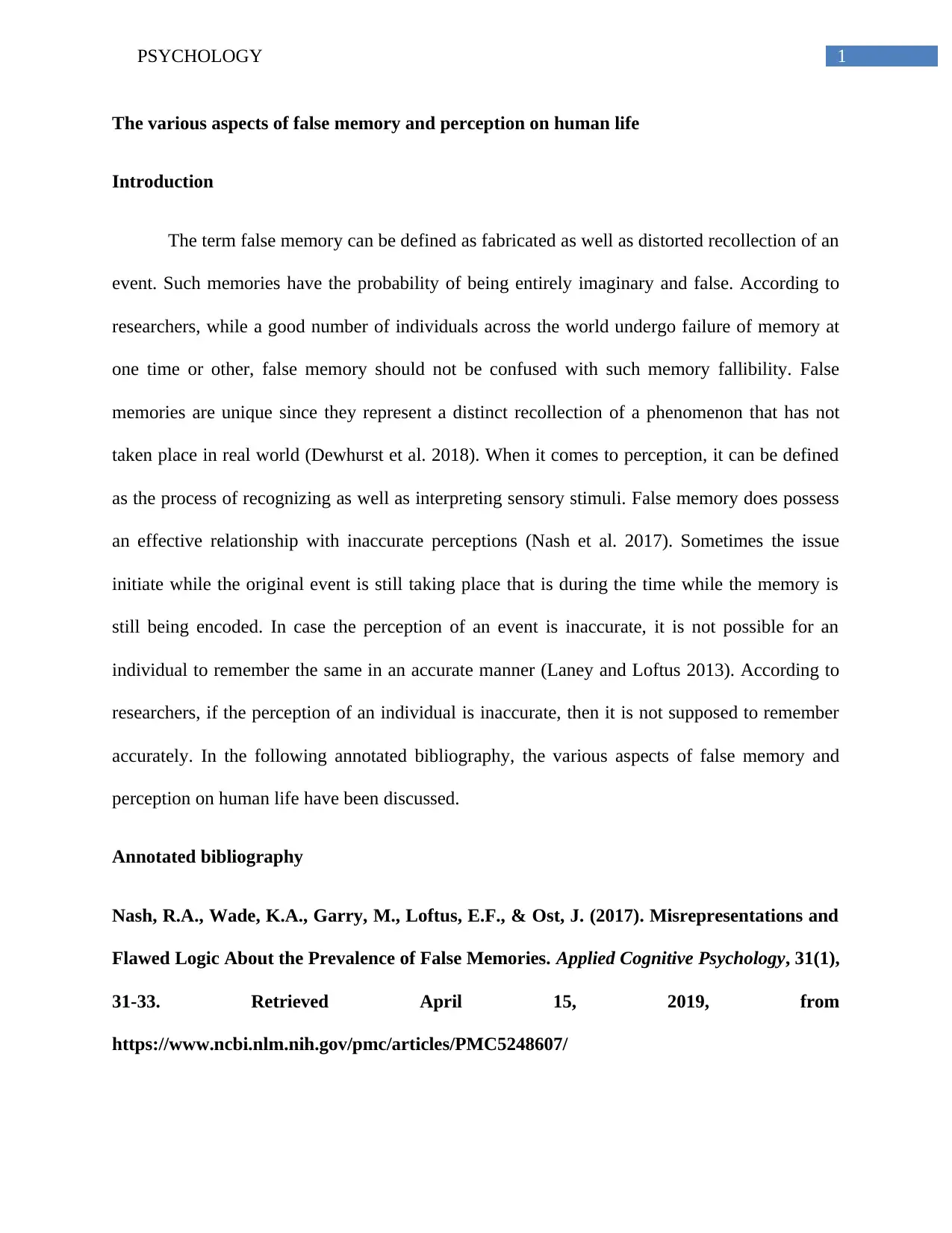
1PSYCHOLOGY
The various aspects of false memory and perception on human life
Introduction
The term false memory can be defined as fabricated as well as distorted recollection of an
event. Such memories have the probability of being entirely imaginary and false. According to
researchers, while a good number of individuals across the world undergo failure of memory at
one time or other, false memory should not be confused with such memory fallibility. False
memories are unique since they represent a distinct recollection of a phenomenon that has not
taken place in real world (Dewhurst et al. 2018). When it comes to perception, it can be defined
as the process of recognizing as well as interpreting sensory stimuli. False memory does possess
an effective relationship with inaccurate perceptions (Nash et al. 2017). Sometimes the issue
initiate while the original event is still taking place that is during the time while the memory is
still being encoded. In case the perception of an event is inaccurate, it is not possible for an
individual to remember the same in an accurate manner (Laney and Loftus 2013). According to
researchers, if the perception of an individual is inaccurate, then it is not supposed to remember
accurately. In the following annotated bibliography, the various aspects of false memory and
perception on human life have been discussed.
Annotated bibliography
Nash, R.A., Wade, K.A., Garry, M., Loftus, E.F., & Ost, J. (2017). Misrepresentations and
Flawed Logic About the Prevalence of False Memories. Applied Cognitive Psychology, 31(1),
31-33. Retrieved April 15, 2019, from
https://www.ncbi.nlm.nih.gov/pmc/articles/PMC5248607/
The various aspects of false memory and perception on human life
Introduction
The term false memory can be defined as fabricated as well as distorted recollection of an
event. Such memories have the probability of being entirely imaginary and false. According to
researchers, while a good number of individuals across the world undergo failure of memory at
one time or other, false memory should not be confused with such memory fallibility. False
memories are unique since they represent a distinct recollection of a phenomenon that has not
taken place in real world (Dewhurst et al. 2018). When it comes to perception, it can be defined
as the process of recognizing as well as interpreting sensory stimuli. False memory does possess
an effective relationship with inaccurate perceptions (Nash et al. 2017). Sometimes the issue
initiate while the original event is still taking place that is during the time while the memory is
still being encoded. In case the perception of an event is inaccurate, it is not possible for an
individual to remember the same in an accurate manner (Laney and Loftus 2013). According to
researchers, if the perception of an individual is inaccurate, then it is not supposed to remember
accurately. In the following annotated bibliography, the various aspects of false memory and
perception on human life have been discussed.
Annotated bibliography
Nash, R.A., Wade, K.A., Garry, M., Loftus, E.F., & Ost, J. (2017). Misrepresentations and
Flawed Logic About the Prevalence of False Memories. Applied Cognitive Psychology, 31(1),
31-33. Retrieved April 15, 2019, from
https://www.ncbi.nlm.nih.gov/pmc/articles/PMC5248607/
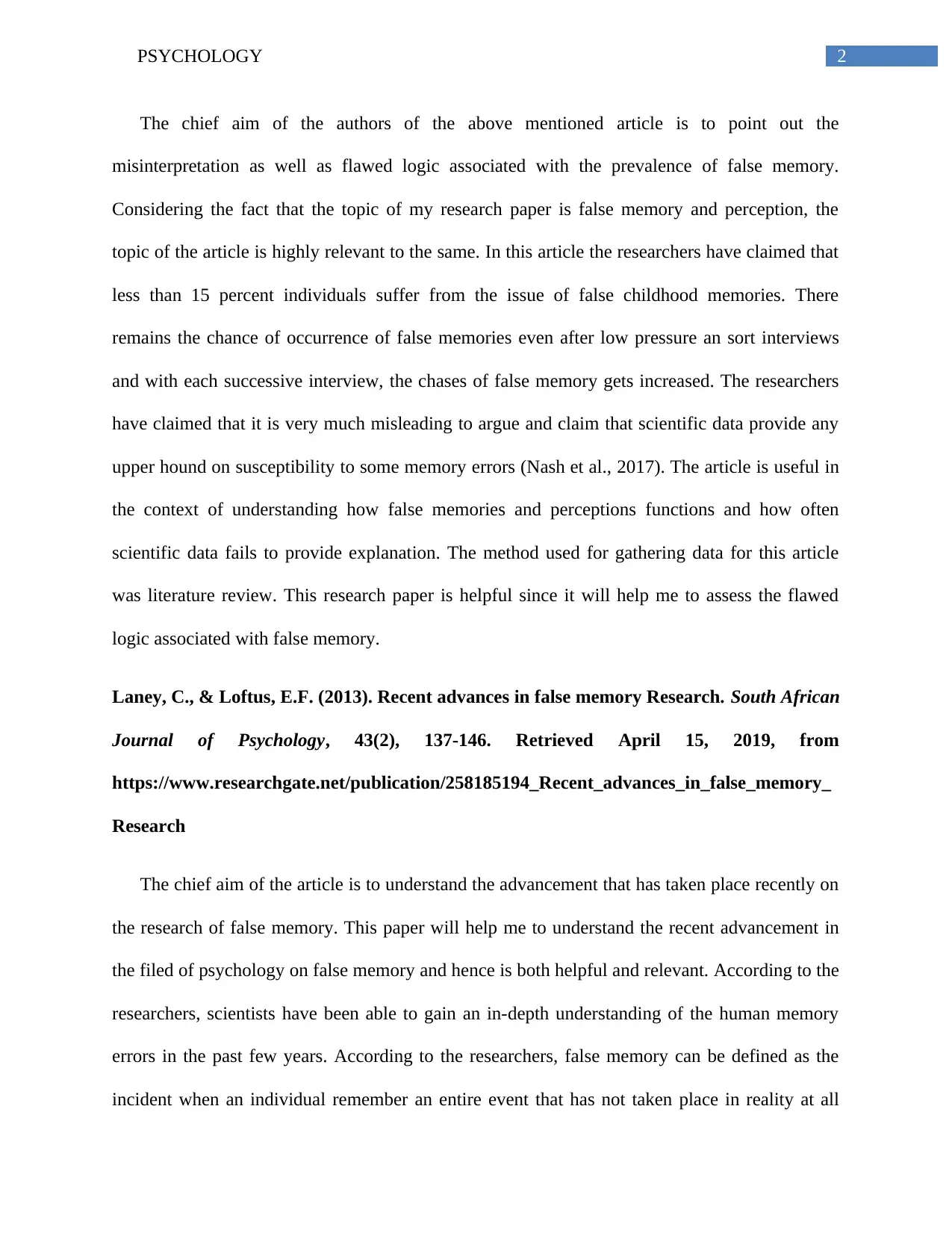
2PSYCHOLOGY
The chief aim of the authors of the above mentioned article is to point out the
misinterpretation as well as flawed logic associated with the prevalence of false memory.
Considering the fact that the topic of my research paper is false memory and perception, the
topic of the article is highly relevant to the same. In this article the researchers have claimed that
less than 15 percent individuals suffer from the issue of false childhood memories. There
remains the chance of occurrence of false memories even after low pressure an sort interviews
and with each successive interview, the chases of false memory gets increased. The researchers
have claimed that it is very much misleading to argue and claim that scientific data provide any
upper hound on susceptibility to some memory errors (Nash et al., 2017). The article is useful in
the context of understanding how false memories and perceptions functions and how often
scientific data fails to provide explanation. The method used for gathering data for this article
was literature review. This research paper is helpful since it will help me to assess the flawed
logic associated with false memory.
Laney, C., & Loftus, E.F. (2013). Recent advances in false memory Research. South African
Journal of Psychology, 43(2), 137-146. Retrieved April 15, 2019, from
https://www.researchgate.net/publication/258185194_Recent_advances_in_false_memory_
Research
The chief aim of the article is to understand the advancement that has taken place recently on
the research of false memory. This paper will help me to understand the recent advancement in
the filed of psychology on false memory and hence is both helpful and relevant. According to the
researchers, scientists have been able to gain an in-depth understanding of the human memory
errors in the past few years. According to the researchers, false memory can be defined as the
incident when an individual remember an entire event that has not taken place in reality at all
The chief aim of the authors of the above mentioned article is to point out the
misinterpretation as well as flawed logic associated with the prevalence of false memory.
Considering the fact that the topic of my research paper is false memory and perception, the
topic of the article is highly relevant to the same. In this article the researchers have claimed that
less than 15 percent individuals suffer from the issue of false childhood memories. There
remains the chance of occurrence of false memories even after low pressure an sort interviews
and with each successive interview, the chases of false memory gets increased. The researchers
have claimed that it is very much misleading to argue and claim that scientific data provide any
upper hound on susceptibility to some memory errors (Nash et al., 2017). The article is useful in
the context of understanding how false memories and perceptions functions and how often
scientific data fails to provide explanation. The method used for gathering data for this article
was literature review. This research paper is helpful since it will help me to assess the flawed
logic associated with false memory.
Laney, C., & Loftus, E.F. (2013). Recent advances in false memory Research. South African
Journal of Psychology, 43(2), 137-146. Retrieved April 15, 2019, from
https://www.researchgate.net/publication/258185194_Recent_advances_in_false_memory_
Research
The chief aim of the article is to understand the advancement that has taken place recently on
the research of false memory. This paper will help me to understand the recent advancement in
the filed of psychology on false memory and hence is both helpful and relevant. According to the
researchers, scientists have been able to gain an in-depth understanding of the human memory
errors in the past few years. According to the researchers, false memory can be defined as the
incident when an individual remember an entire event that has not taken place in reality at all
⊘ This is a preview!⊘
Do you want full access?
Subscribe today to unlock all pages.

Trusted by 1+ million students worldwide
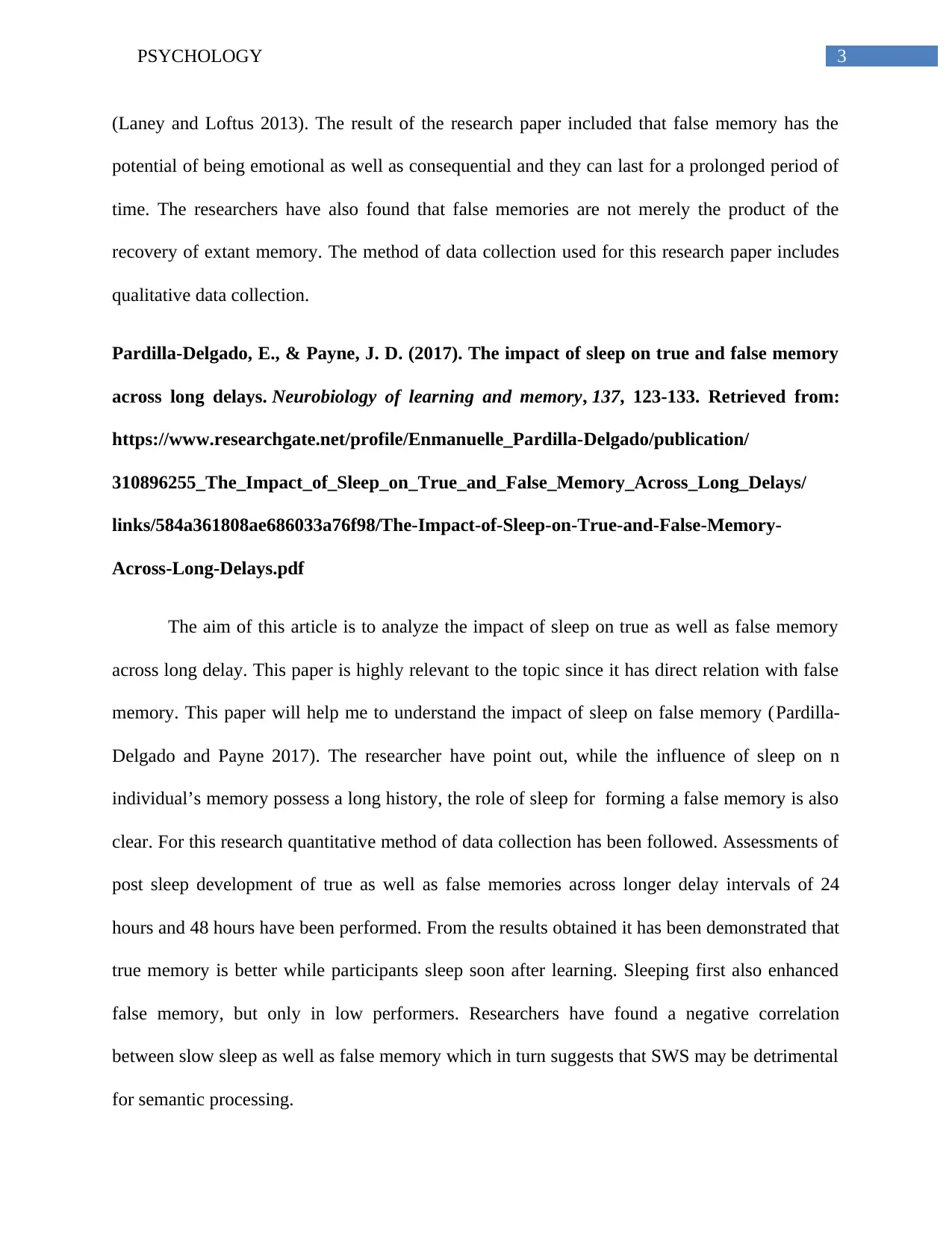
3PSYCHOLOGY
(Laney and Loftus 2013). The result of the research paper included that false memory has the
potential of being emotional as well as consequential and they can last for a prolonged period of
time. The researchers have also found that false memories are not merely the product of the
recovery of extant memory. The method of data collection used for this research paper includes
qualitative data collection.
Pardilla-Delgado, E., & Payne, J. D. (2017). The impact of sleep on true and false memory
across long delays. Neurobiology of learning and memory, 137, 123-133. Retrieved from:
https://www.researchgate.net/profile/Enmanuelle_Pardilla-Delgado/publication/
310896255_The_Impact_of_Sleep_on_True_and_False_Memory_Across_Long_Delays/
links/584a361808ae686033a76f98/The-Impact-of-Sleep-on-True-and-False-Memory-
Across-Long-Delays.pdf
The aim of this article is to analyze the impact of sleep on true as well as false memory
across long delay. This paper is highly relevant to the topic since it has direct relation with false
memory. This paper will help me to understand the impact of sleep on false memory (Pardilla-
Delgado and Payne 2017). The researcher have point out, while the influence of sleep on n
individual’s memory possess a long history, the role of sleep for forming a false memory is also
clear. For this research quantitative method of data collection has been followed. Assessments of
post sleep development of true as well as false memories across longer delay intervals of 24
hours and 48 hours have been performed. From the results obtained it has been demonstrated that
true memory is better while participants sleep soon after learning. Sleeping first also enhanced
false memory, but only in low performers. Researchers have found a negative correlation
between slow sleep as well as false memory which in turn suggests that SWS may be detrimental
for semantic processing.
(Laney and Loftus 2013). The result of the research paper included that false memory has the
potential of being emotional as well as consequential and they can last for a prolonged period of
time. The researchers have also found that false memories are not merely the product of the
recovery of extant memory. The method of data collection used for this research paper includes
qualitative data collection.
Pardilla-Delgado, E., & Payne, J. D. (2017). The impact of sleep on true and false memory
across long delays. Neurobiology of learning and memory, 137, 123-133. Retrieved from:
https://www.researchgate.net/profile/Enmanuelle_Pardilla-Delgado/publication/
310896255_The_Impact_of_Sleep_on_True_and_False_Memory_Across_Long_Delays/
links/584a361808ae686033a76f98/The-Impact-of-Sleep-on-True-and-False-Memory-
Across-Long-Delays.pdf
The aim of this article is to analyze the impact of sleep on true as well as false memory
across long delay. This paper is highly relevant to the topic since it has direct relation with false
memory. This paper will help me to understand the impact of sleep on false memory (Pardilla-
Delgado and Payne 2017). The researcher have point out, while the influence of sleep on n
individual’s memory possess a long history, the role of sleep for forming a false memory is also
clear. For this research quantitative method of data collection has been followed. Assessments of
post sleep development of true as well as false memories across longer delay intervals of 24
hours and 48 hours have been performed. From the results obtained it has been demonstrated that
true memory is better while participants sleep soon after learning. Sleeping first also enhanced
false memory, but only in low performers. Researchers have found a negative correlation
between slow sleep as well as false memory which in turn suggests that SWS may be detrimental
for semantic processing.
Paraphrase This Document
Need a fresh take? Get an instant paraphrase of this document with our AI Paraphraser
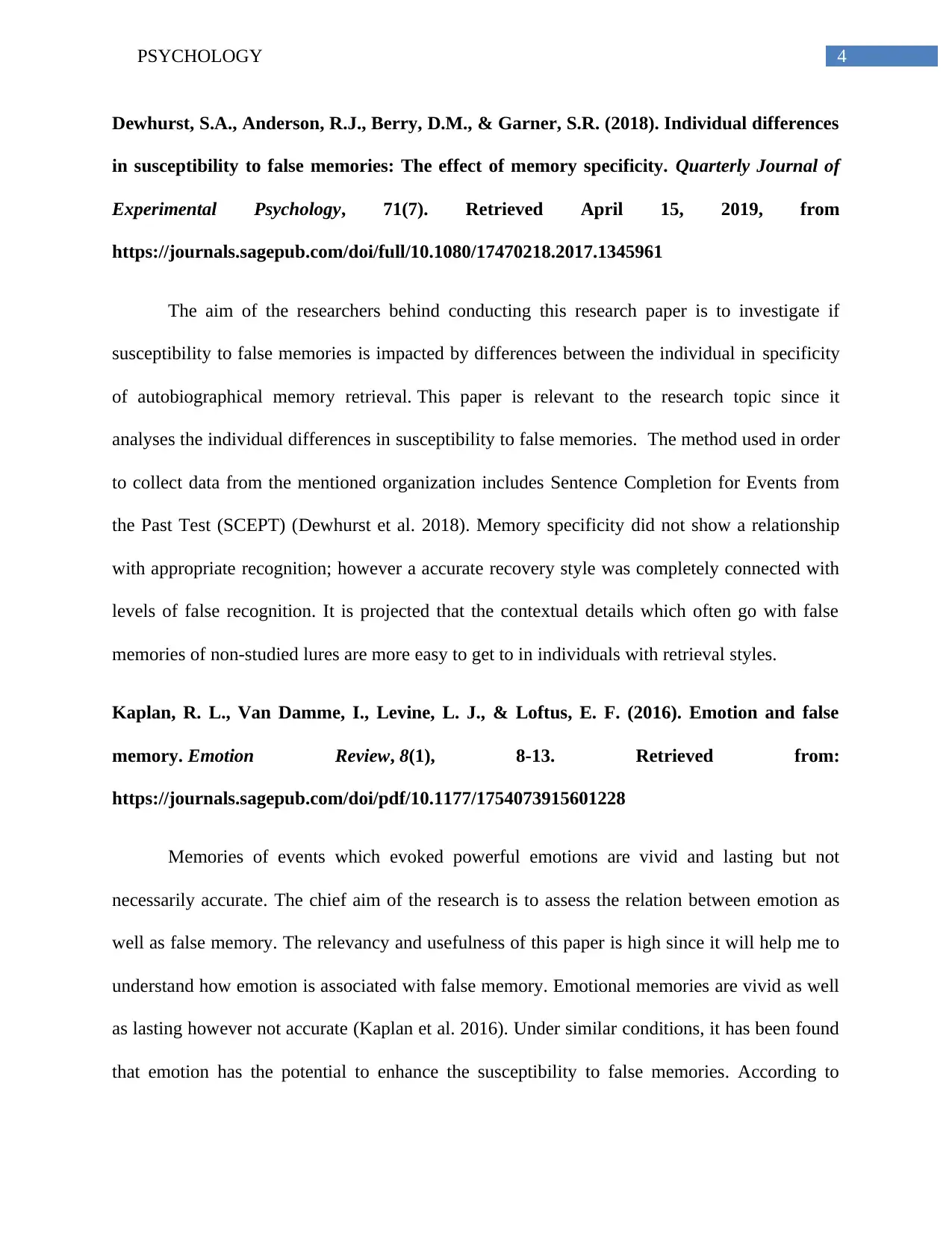
4PSYCHOLOGY
Dewhurst, S.A., Anderson, R.J., Berry, D.M., & Garner, S.R. (2018). Individual differences
in susceptibility to false memories: The effect of memory specificity. Quarterly Journal of
Experimental Psychology, 71(7). Retrieved April 15, 2019, from
https://journals.sagepub.com/doi/full/10.1080/17470218.2017.1345961
The aim of the researchers behind conducting this research paper is to investigate if
susceptibility to false memories is impacted by differences between the individual in specificity
of autobiographical memory retrieval. This paper is relevant to the research topic since it
analyses the individual differences in susceptibility to false memories. The method used in order
to collect data from the mentioned organization includes Sentence Completion for Events from
the Past Test (SCEPT) (Dewhurst et al. 2018). Memory specificity did not show a relationship
with appropriate recognition; however a accurate recovery style was completely connected with
levels of false recognition. It is projected that the contextual details which often go with false
memories of non-studied lures are more easy to get to in individuals with retrieval styles.
Kaplan, R. L., Van Damme, I., Levine, L. J., & Loftus, E. F. (2016). Emotion and false
memory. Emotion Review, 8(1), 8-13. Retrieved from:
https://journals.sagepub.com/doi/pdf/10.1177/1754073915601228
Memories of events which evoked powerful emotions are vivid and lasting but not
necessarily accurate. The chief aim of the research is to assess the relation between emotion as
well as false memory. The relevancy and usefulness of this paper is high since it will help me to
understand how emotion is associated with false memory. Emotional memories are vivid as well
as lasting however not accurate (Kaplan et al. 2016). Under similar conditions, it has been found
that emotion has the potential to enhance the susceptibility to false memories. According to
Dewhurst, S.A., Anderson, R.J., Berry, D.M., & Garner, S.R. (2018). Individual differences
in susceptibility to false memories: The effect of memory specificity. Quarterly Journal of
Experimental Psychology, 71(7). Retrieved April 15, 2019, from
https://journals.sagepub.com/doi/full/10.1080/17470218.2017.1345961
The aim of the researchers behind conducting this research paper is to investigate if
susceptibility to false memories is impacted by differences between the individual in specificity
of autobiographical memory retrieval. This paper is relevant to the research topic since it
analyses the individual differences in susceptibility to false memories. The method used in order
to collect data from the mentioned organization includes Sentence Completion for Events from
the Past Test (SCEPT) (Dewhurst et al. 2018). Memory specificity did not show a relationship
with appropriate recognition; however a accurate recovery style was completely connected with
levels of false recognition. It is projected that the contextual details which often go with false
memories of non-studied lures are more easy to get to in individuals with retrieval styles.
Kaplan, R. L., Van Damme, I., Levine, L. J., & Loftus, E. F. (2016). Emotion and false
memory. Emotion Review, 8(1), 8-13. Retrieved from:
https://journals.sagepub.com/doi/pdf/10.1177/1754073915601228
Memories of events which evoked powerful emotions are vivid and lasting but not
necessarily accurate. The chief aim of the research is to assess the relation between emotion as
well as false memory. The relevancy and usefulness of this paper is high since it will help me to
understand how emotion is associated with false memory. Emotional memories are vivid as well
as lasting however not accurate (Kaplan et al. 2016). Under similar conditions, it has been found
that emotion has the potential to enhance the susceptibility to false memories. According to
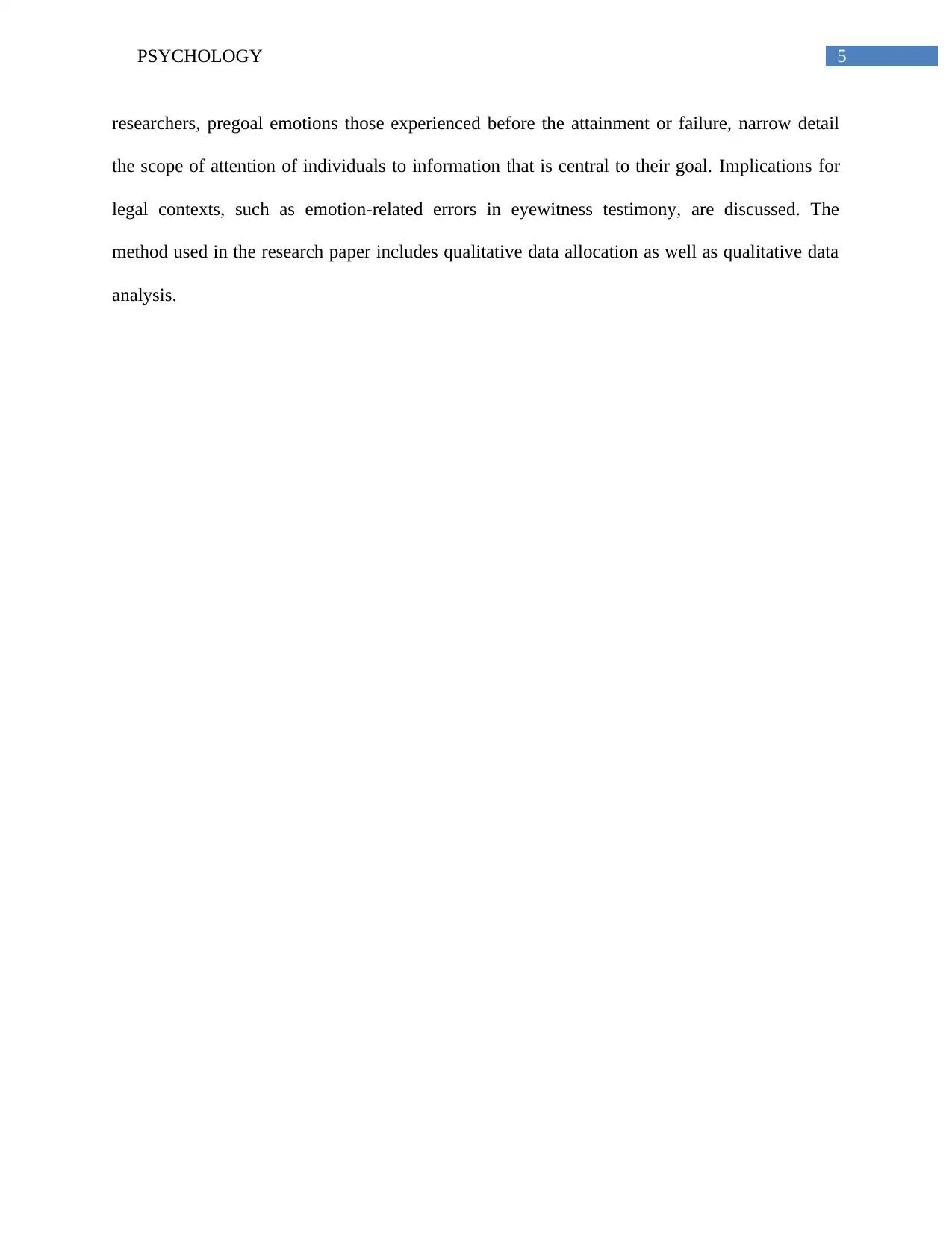
5PSYCHOLOGY
researchers, pregoal emotions those experienced before the attainment or failure, narrow detail
the scope of attention of individuals to information that is central to their goal. Implications for
legal contexts, such as emotion-related errors in eyewitness testimony, are discussed. The
method used in the research paper includes qualitative data allocation as well as qualitative data
analysis.
researchers, pregoal emotions those experienced before the attainment or failure, narrow detail
the scope of attention of individuals to information that is central to their goal. Implications for
legal contexts, such as emotion-related errors in eyewitness testimony, are discussed. The
method used in the research paper includes qualitative data allocation as well as qualitative data
analysis.
⊘ This is a preview!⊘
Do you want full access?
Subscribe today to unlock all pages.

Trusted by 1+ million students worldwide
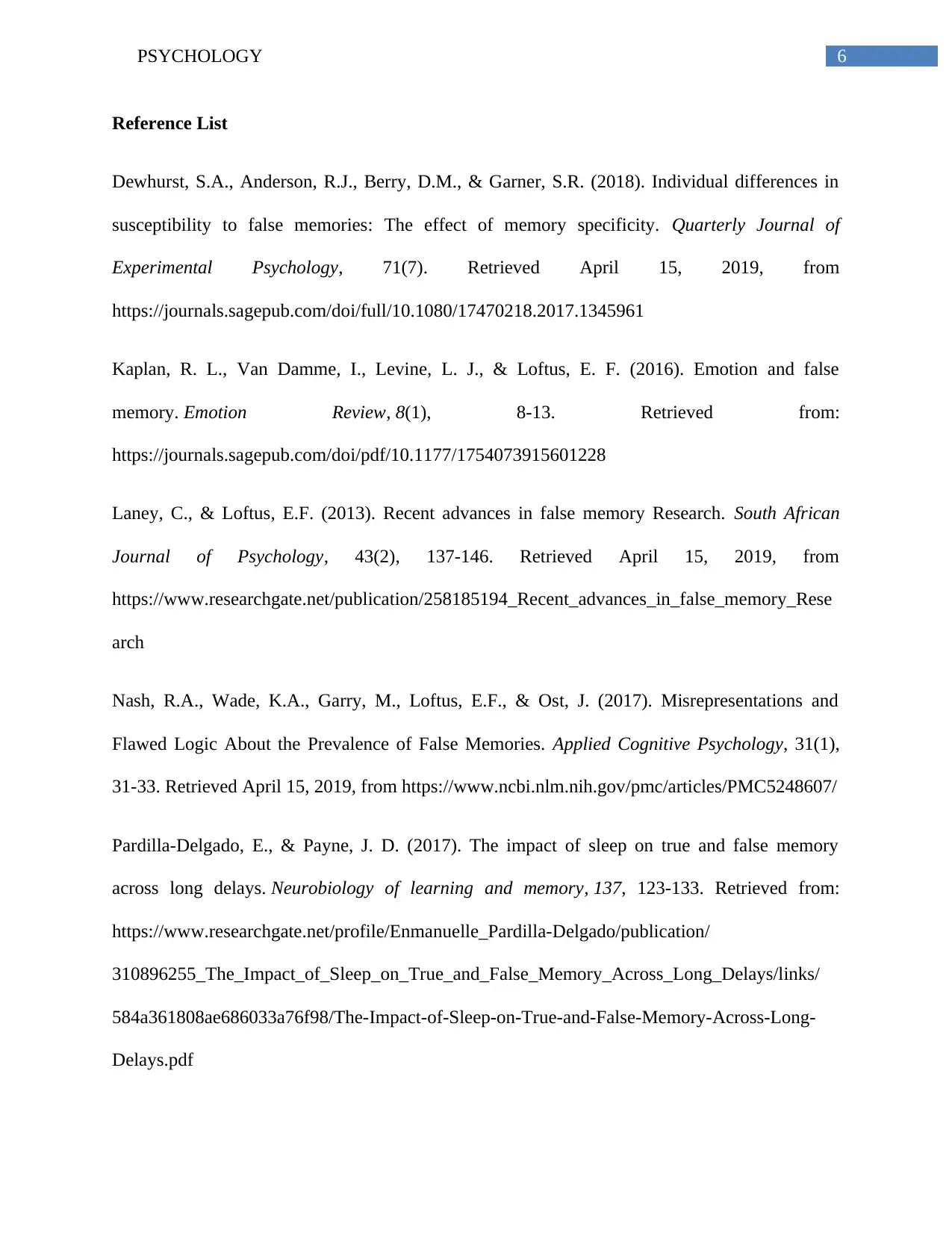
6PSYCHOLOGY
Reference List
Dewhurst, S.A., Anderson, R.J., Berry, D.M., & Garner, S.R. (2018). Individual differences in
susceptibility to false memories: The effect of memory specificity. Quarterly Journal of
Experimental Psychology, 71(7). Retrieved April 15, 2019, from
https://journals.sagepub.com/doi/full/10.1080/17470218.2017.1345961
Kaplan, R. L., Van Damme, I., Levine, L. J., & Loftus, E. F. (2016). Emotion and false
memory. Emotion Review, 8(1), 8-13. Retrieved from:
https://journals.sagepub.com/doi/pdf/10.1177/1754073915601228
Laney, C., & Loftus, E.F. (2013). Recent advances in false memory Research. South African
Journal of Psychology, 43(2), 137-146. Retrieved April 15, 2019, from
https://www.researchgate.net/publication/258185194_Recent_advances_in_false_memory_Rese
arch
Nash, R.A., Wade, K.A., Garry, M., Loftus, E.F., & Ost, J. (2017). Misrepresentations and
Flawed Logic About the Prevalence of False Memories. Applied Cognitive Psychology, 31(1),
31-33. Retrieved April 15, 2019, from https://www.ncbi.nlm.nih.gov/pmc/articles/PMC5248607/
Pardilla-Delgado, E., & Payne, J. D. (2017). The impact of sleep on true and false memory
across long delays. Neurobiology of learning and memory, 137, 123-133. Retrieved from:
https://www.researchgate.net/profile/Enmanuelle_Pardilla-Delgado/publication/
310896255_The_Impact_of_Sleep_on_True_and_False_Memory_Across_Long_Delays/links/
584a361808ae686033a76f98/The-Impact-of-Sleep-on-True-and-False-Memory-Across-Long-
Delays.pdf
Reference List
Dewhurst, S.A., Anderson, R.J., Berry, D.M., & Garner, S.R. (2018). Individual differences in
susceptibility to false memories: The effect of memory specificity. Quarterly Journal of
Experimental Psychology, 71(7). Retrieved April 15, 2019, from
https://journals.sagepub.com/doi/full/10.1080/17470218.2017.1345961
Kaplan, R. L., Van Damme, I., Levine, L. J., & Loftus, E. F. (2016). Emotion and false
memory. Emotion Review, 8(1), 8-13. Retrieved from:
https://journals.sagepub.com/doi/pdf/10.1177/1754073915601228
Laney, C., & Loftus, E.F. (2013). Recent advances in false memory Research. South African
Journal of Psychology, 43(2), 137-146. Retrieved April 15, 2019, from
https://www.researchgate.net/publication/258185194_Recent_advances_in_false_memory_Rese
arch
Nash, R.A., Wade, K.A., Garry, M., Loftus, E.F., & Ost, J. (2017). Misrepresentations and
Flawed Logic About the Prevalence of False Memories. Applied Cognitive Psychology, 31(1),
31-33. Retrieved April 15, 2019, from https://www.ncbi.nlm.nih.gov/pmc/articles/PMC5248607/
Pardilla-Delgado, E., & Payne, J. D. (2017). The impact of sleep on true and false memory
across long delays. Neurobiology of learning and memory, 137, 123-133. Retrieved from:
https://www.researchgate.net/profile/Enmanuelle_Pardilla-Delgado/publication/
310896255_The_Impact_of_Sleep_on_True_and_False_Memory_Across_Long_Delays/links/
584a361808ae686033a76f98/The-Impact-of-Sleep-on-True-and-False-Memory-Across-Long-
Delays.pdf
Paraphrase This Document
Need a fresh take? Get an instant paraphrase of this document with our AI Paraphraser
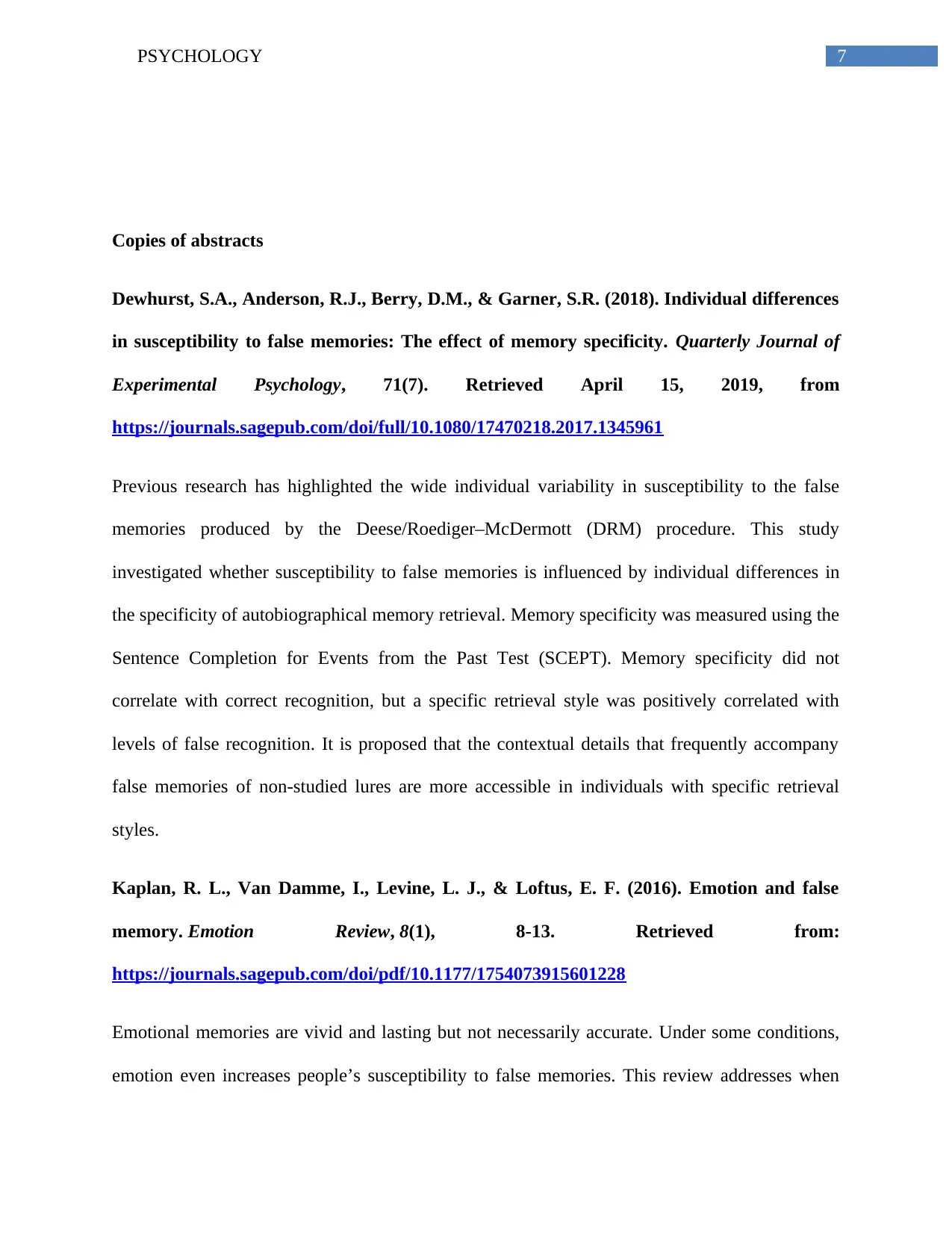
7PSYCHOLOGY
Copies of abstracts
Dewhurst, S.A., Anderson, R.J., Berry, D.M., & Garner, S.R. (2018). Individual differences
in susceptibility to false memories: The effect of memory specificity. Quarterly Journal of
Experimental Psychology, 71(7). Retrieved April 15, 2019, from
https://journals.sagepub.com/doi/full/10.1080/17470218.2017.1345961
Previous research has highlighted the wide individual variability in susceptibility to the false
memories produced by the Deese/Roediger–McDermott (DRM) procedure. This study
investigated whether susceptibility to false memories is influenced by individual differences in
the specificity of autobiographical memory retrieval. Memory specificity was measured using the
Sentence Completion for Events from the Past Test (SCEPT). Memory specificity did not
correlate with correct recognition, but a specific retrieval style was positively correlated with
levels of false recognition. It is proposed that the contextual details that frequently accompany
false memories of non-studied lures are more accessible in individuals with specific retrieval
styles.
Kaplan, R. L., Van Damme, I., Levine, L. J., & Loftus, E. F. (2016). Emotion and false
memory. Emotion Review, 8(1), 8-13. Retrieved from:
https://journals.sagepub.com/doi/pdf/10.1177/1754073915601228
Emotional memories are vivid and lasting but not necessarily accurate. Under some conditions,
emotion even increases people’s susceptibility to false memories. This review addresses when
Copies of abstracts
Dewhurst, S.A., Anderson, R.J., Berry, D.M., & Garner, S.R. (2018). Individual differences
in susceptibility to false memories: The effect of memory specificity. Quarterly Journal of
Experimental Psychology, 71(7). Retrieved April 15, 2019, from
https://journals.sagepub.com/doi/full/10.1080/17470218.2017.1345961
Previous research has highlighted the wide individual variability in susceptibility to the false
memories produced by the Deese/Roediger–McDermott (DRM) procedure. This study
investigated whether susceptibility to false memories is influenced by individual differences in
the specificity of autobiographical memory retrieval. Memory specificity was measured using the
Sentence Completion for Events from the Past Test (SCEPT). Memory specificity did not
correlate with correct recognition, but a specific retrieval style was positively correlated with
levels of false recognition. It is proposed that the contextual details that frequently accompany
false memories of non-studied lures are more accessible in individuals with specific retrieval
styles.
Kaplan, R. L., Van Damme, I., Levine, L. J., & Loftus, E. F. (2016). Emotion and false
memory. Emotion Review, 8(1), 8-13. Retrieved from:
https://journals.sagepub.com/doi/pdf/10.1177/1754073915601228
Emotional memories are vivid and lasting but not necessarily accurate. Under some conditions,
emotion even increases people’s susceptibility to false memories. This review addresses when
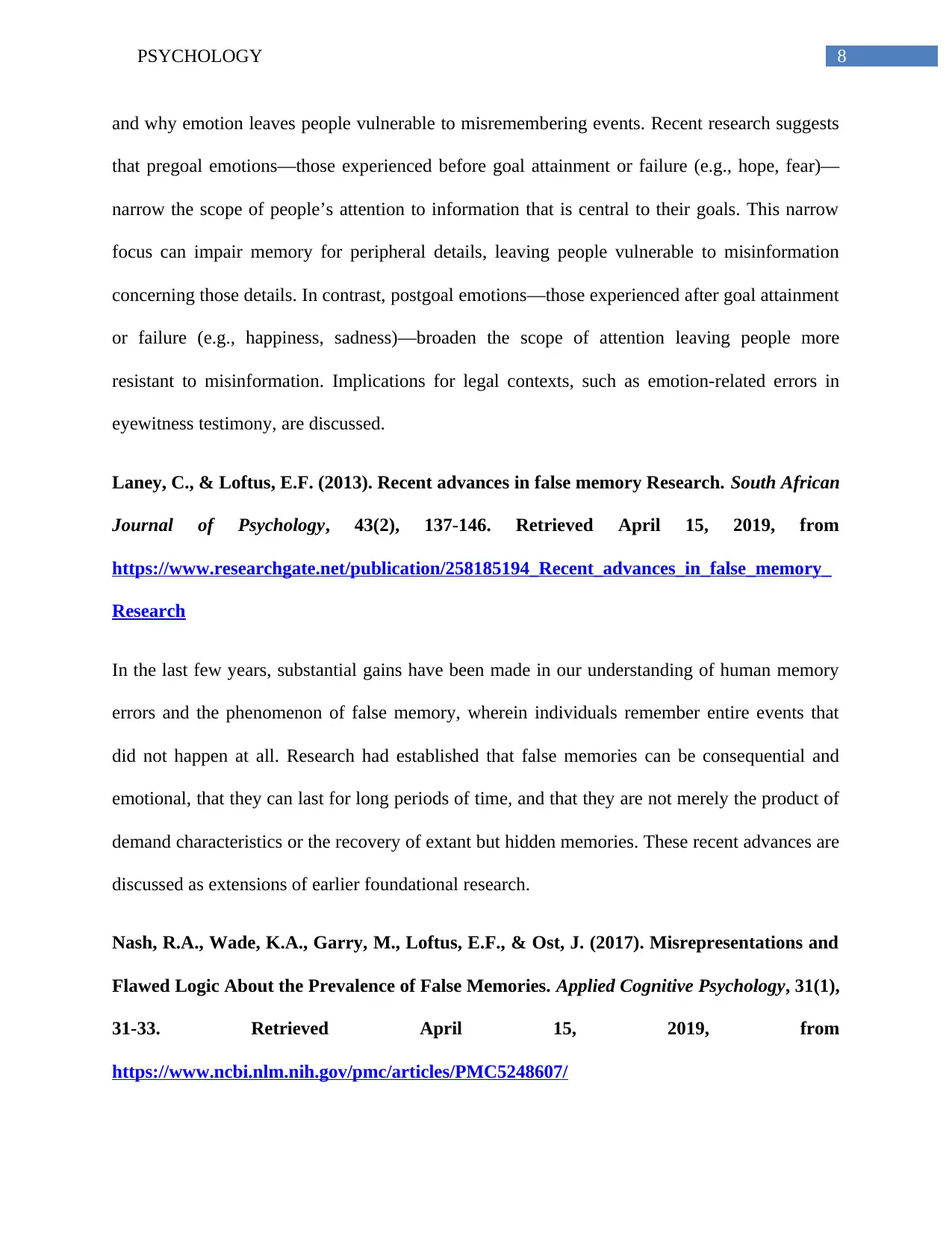
8PSYCHOLOGY
and why emotion leaves people vulnerable to misremembering events. Recent research suggests
that pregoal emotions—those experienced before goal attainment or failure (e.g., hope, fear)—
narrow the scope of people’s attention to information that is central to their goals. This narrow
focus can impair memory for peripheral details, leaving people vulnerable to misinformation
concerning those details. In contrast, postgoal emotions—those experienced after goal attainment
or failure (e.g., happiness, sadness)—broaden the scope of attention leaving people more
resistant to misinformation. Implications for legal contexts, such as emotion-related errors in
eyewitness testimony, are discussed.
Laney, C., & Loftus, E.F. (2013). Recent advances in false memory Research. South African
Journal of Psychology, 43(2), 137-146. Retrieved April 15, 2019, from
https://www.researchgate.net/publication/258185194_Recent_advances_in_false_memory_
Research
In the last few years, substantial gains have been made in our understanding of human memory
errors and the phenomenon of false memory, wherein individuals remember entire events that
did not happen at all. Research had established that false memories can be consequential and
emotional, that they can last for long periods of time, and that they are not merely the product of
demand characteristics or the recovery of extant but hidden memories. These recent advances are
discussed as extensions of earlier foundational research.
Nash, R.A., Wade, K.A., Garry, M., Loftus, E.F., & Ost, J. (2017). Misrepresentations and
Flawed Logic About the Prevalence of False Memories. Applied Cognitive Psychology, 31(1),
31-33. Retrieved April 15, 2019, from
https://www.ncbi.nlm.nih.gov/pmc/articles/PMC5248607/
and why emotion leaves people vulnerable to misremembering events. Recent research suggests
that pregoal emotions—those experienced before goal attainment or failure (e.g., hope, fear)—
narrow the scope of people’s attention to information that is central to their goals. This narrow
focus can impair memory for peripheral details, leaving people vulnerable to misinformation
concerning those details. In contrast, postgoal emotions—those experienced after goal attainment
or failure (e.g., happiness, sadness)—broaden the scope of attention leaving people more
resistant to misinformation. Implications for legal contexts, such as emotion-related errors in
eyewitness testimony, are discussed.
Laney, C., & Loftus, E.F. (2013). Recent advances in false memory Research. South African
Journal of Psychology, 43(2), 137-146. Retrieved April 15, 2019, from
https://www.researchgate.net/publication/258185194_Recent_advances_in_false_memory_
Research
In the last few years, substantial gains have been made in our understanding of human memory
errors and the phenomenon of false memory, wherein individuals remember entire events that
did not happen at all. Research had established that false memories can be consequential and
emotional, that they can last for long periods of time, and that they are not merely the product of
demand characteristics or the recovery of extant but hidden memories. These recent advances are
discussed as extensions of earlier foundational research.
Nash, R.A., Wade, K.A., Garry, M., Loftus, E.F., & Ost, J. (2017). Misrepresentations and
Flawed Logic About the Prevalence of False Memories. Applied Cognitive Psychology, 31(1),
31-33. Retrieved April 15, 2019, from
https://www.ncbi.nlm.nih.gov/pmc/articles/PMC5248607/
⊘ This is a preview!⊘
Do you want full access?
Subscribe today to unlock all pages.

Trusted by 1+ million students worldwide
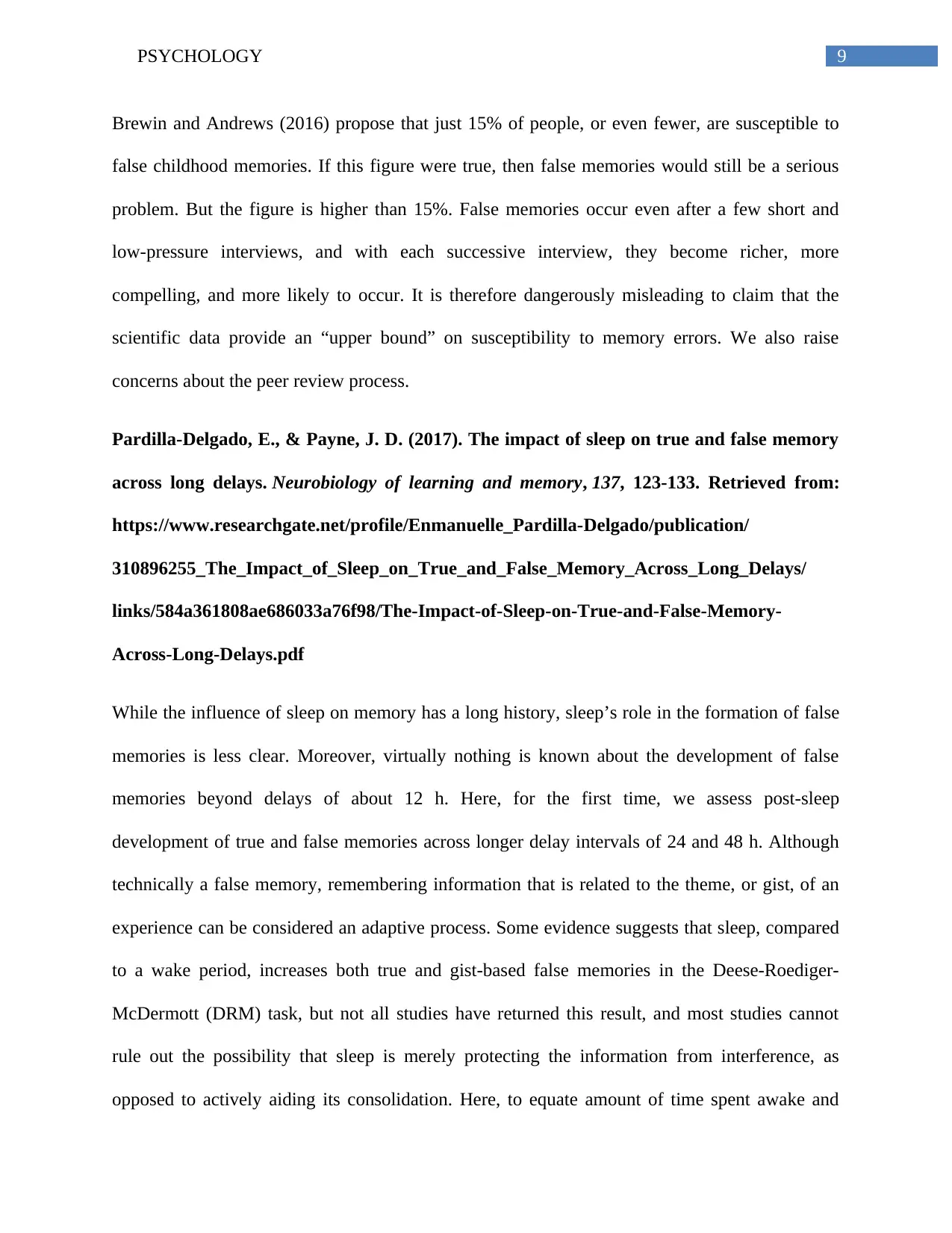
9PSYCHOLOGY
Brewin and Andrews (2016) propose that just 15% of people, or even fewer, are susceptible to
false childhood memories. If this figure were true, then false memories would still be a serious
problem. But the figure is higher than 15%. False memories occur even after a few short and
low-pressure interviews, and with each successive interview, they become richer, more
compelling, and more likely to occur. It is therefore dangerously misleading to claim that the
scientific data provide an “upper bound” on susceptibility to memory errors. We also raise
concerns about the peer review process.
Pardilla-Delgado, E., & Payne, J. D. (2017). The impact of sleep on true and false memory
across long delays. Neurobiology of learning and memory, 137, 123-133. Retrieved from:
https://www.researchgate.net/profile/Enmanuelle_Pardilla-Delgado/publication/
310896255_The_Impact_of_Sleep_on_True_and_False_Memory_Across_Long_Delays/
links/584a361808ae686033a76f98/The-Impact-of-Sleep-on-True-and-False-Memory-
Across-Long-Delays.pdf
While the influence of sleep on memory has a long history, sleep’s role in the formation of false
memories is less clear. Moreover, virtually nothing is known about the development of false
memories beyond delays of about 12 h. Here, for the first time, we assess post-sleep
development of true and false memories across longer delay intervals of 24 and 48 h. Although
technically a false memory, remembering information that is related to the theme, or gist, of an
experience can be considered an adaptive process. Some evidence suggests that sleep, compared
to a wake period, increases both true and gist-based false memories in the Deese-Roediger-
McDermott (DRM) task, but not all studies have returned this result, and most studies cannot
rule out the possibility that sleep is merely protecting the information from interference, as
opposed to actively aiding its consolidation. Here, to equate amount of time spent awake and
Brewin and Andrews (2016) propose that just 15% of people, or even fewer, are susceptible to
false childhood memories. If this figure were true, then false memories would still be a serious
problem. But the figure is higher than 15%. False memories occur even after a few short and
low-pressure interviews, and with each successive interview, they become richer, more
compelling, and more likely to occur. It is therefore dangerously misleading to claim that the
scientific data provide an “upper bound” on susceptibility to memory errors. We also raise
concerns about the peer review process.
Pardilla-Delgado, E., & Payne, J. D. (2017). The impact of sleep on true and false memory
across long delays. Neurobiology of learning and memory, 137, 123-133. Retrieved from:
https://www.researchgate.net/profile/Enmanuelle_Pardilla-Delgado/publication/
310896255_The_Impact_of_Sleep_on_True_and_False_Memory_Across_Long_Delays/
links/584a361808ae686033a76f98/The-Impact-of-Sleep-on-True-and-False-Memory-
Across-Long-Delays.pdf
While the influence of sleep on memory has a long history, sleep’s role in the formation of false
memories is less clear. Moreover, virtually nothing is known about the development of false
memories beyond delays of about 12 h. Here, for the first time, we assess post-sleep
development of true and false memories across longer delay intervals of 24 and 48 h. Although
technically a false memory, remembering information that is related to the theme, or gist, of an
experience can be considered an adaptive process. Some evidence suggests that sleep, compared
to a wake period, increases both true and gist-based false memories in the Deese-Roediger-
McDermott (DRM) task, but not all studies have returned this result, and most studies cannot
rule out the possibility that sleep is merely protecting the information from interference, as
opposed to actively aiding its consolidation. Here, to equate amount of time spent awake and
Paraphrase This Document
Need a fresh take? Get an instant paraphrase of this document with our AI Paraphraser
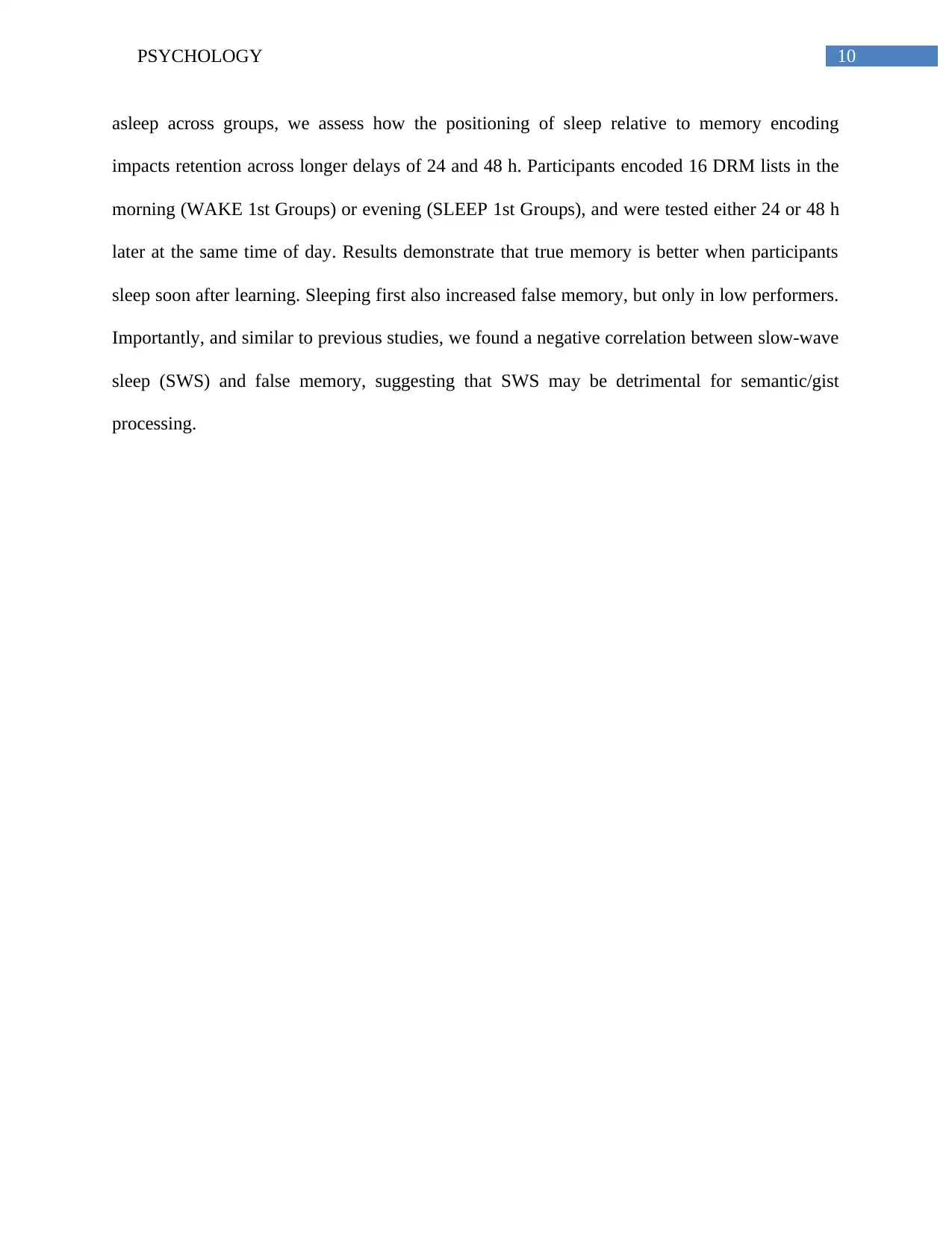
10PSYCHOLOGY
asleep across groups, we assess how the positioning of sleep relative to memory encoding
impacts retention across longer delays of 24 and 48 h. Participants encoded 16 DRM lists in the
morning (WAKE 1st Groups) or evening (SLEEP 1st Groups), and were tested either 24 or 48 h
later at the same time of day. Results demonstrate that true memory is better when participants
sleep soon after learning. Sleeping first also increased false memory, but only in low performers.
Importantly, and similar to previous studies, we found a negative correlation between slow-wave
sleep (SWS) and false memory, suggesting that SWS may be detrimental for semantic/gist
processing.
asleep across groups, we assess how the positioning of sleep relative to memory encoding
impacts retention across longer delays of 24 and 48 h. Participants encoded 16 DRM lists in the
morning (WAKE 1st Groups) or evening (SLEEP 1st Groups), and were tested either 24 or 48 h
later at the same time of day. Results demonstrate that true memory is better when participants
sleep soon after learning. Sleeping first also increased false memory, but only in low performers.
Importantly, and similar to previous studies, we found a negative correlation between slow-wave
sleep (SWS) and false memory, suggesting that SWS may be detrimental for semantic/gist
processing.
1 out of 11
Your All-in-One AI-Powered Toolkit for Academic Success.
+13062052269
info@desklib.com
Available 24*7 on WhatsApp / Email
![[object Object]](/_next/static/media/star-bottom.7253800d.svg)
Unlock your academic potential
Copyright © 2020–2026 A2Z Services. All Rights Reserved. Developed and managed by ZUCOL.